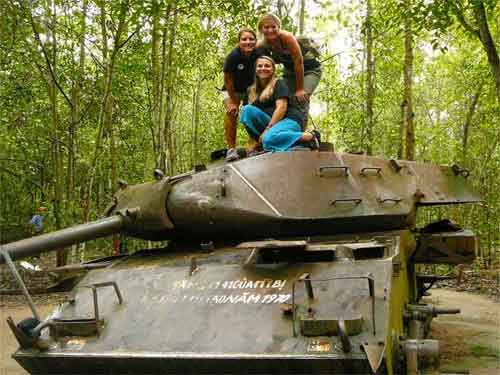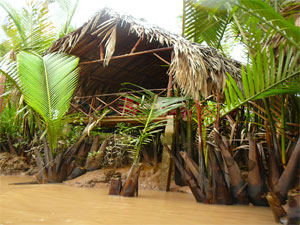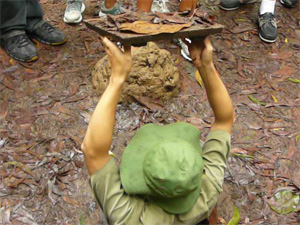Semester at
Sea Fall
2006 Voyage 
War Tours?
By: Danica Taylor

I found
being in
In and around Ho Chi Minh City the
transnational element was quite evident. New skyscrapers being built in
what my
tour guide described as “new town”. A place where international
companies were
opening stores and the government was investing money in developing and
maintaining westernized landscapes, roads and complexes.
There was no evidence that this country was
once a battlefield, a place where almost all vernacular architecture
was
destroyed by air raids and grenades. The Vietnamese however have
restored their
old way of life. Many still reside in the delta, villagers who came out
of the
Cu Chi tunnels to rebuild their thatched roof homes and digressed back
to
the
life they lived prior to invasion.  I was so
intrigued to see how contently they
were living their life, even after having to completely reconstruct
their
villages that were destroyed during the American War.
I was so
intrigued to see how contently they
were living their life, even after having to completely reconstruct
their
villages that were destroyed during the American War.
After the war, foreigners,
especially Americans were
scared
and uninterested in visiting the land that so many soldiers sacrificed
their
lives on. But more recently, as
Christina Schwenkel points out in her article titled “Recombinant
History: Transnational Practices of
Memory and Knowledge Production in Contemporary Vietnam,”
“Vietnam has adopted tourism as a prime
development
strategy to produce economic growth” (p. 4), and as a result
the locals
have had to adapt to the large increase in tourism; caucasians with
blonde
hair and blue eyes, technology unimaginable being used to snap pictures
of
their villages, of their homes and of their families.
We visited the Cu
Chi tunnels
where
a local Vietnamese man guided us though the various traps and tunnels.  The
locals are making their living from telling personal stories from the
war, and
are even being educated in “the conflict as it has been represented in
the
United States history and pop culture” (Schwenkel, 7). The guide was in
no way
telling us actual stories he had of the war, it was a fabricated speech
given
to the tourists to be informative and supportive of the VC and still
not offend
American tourists. To top off the whole tourist experience, at the end
of the
tour there’s the opportunity to shoot “authentic” war guns. At the
small price
of around $5-$10.
The
locals are making their living from telling personal stories from the
war, and
are even being educated in “the conflict as it has been represented in
the
United States history and pop culture” (Schwenkel, 7). The guide was in
no way
telling us actual stories he had of the war, it was a fabricated speech
given
to the tourists to be informative and supportive of the VC and still
not offend
American tourists. To top off the whole tourist experience, at the end
of the
tour there’s the opportunity to shoot “authentic” war guns. At the
small price
of around $5-$10.
Overall, Vietnam